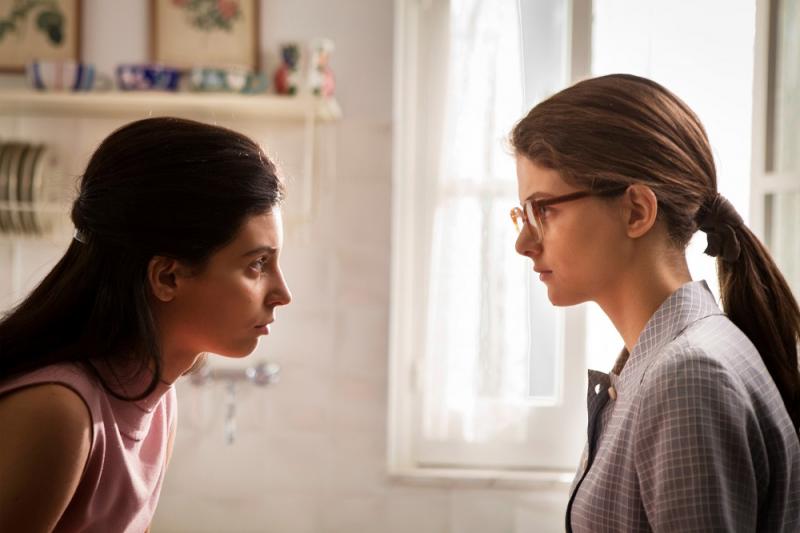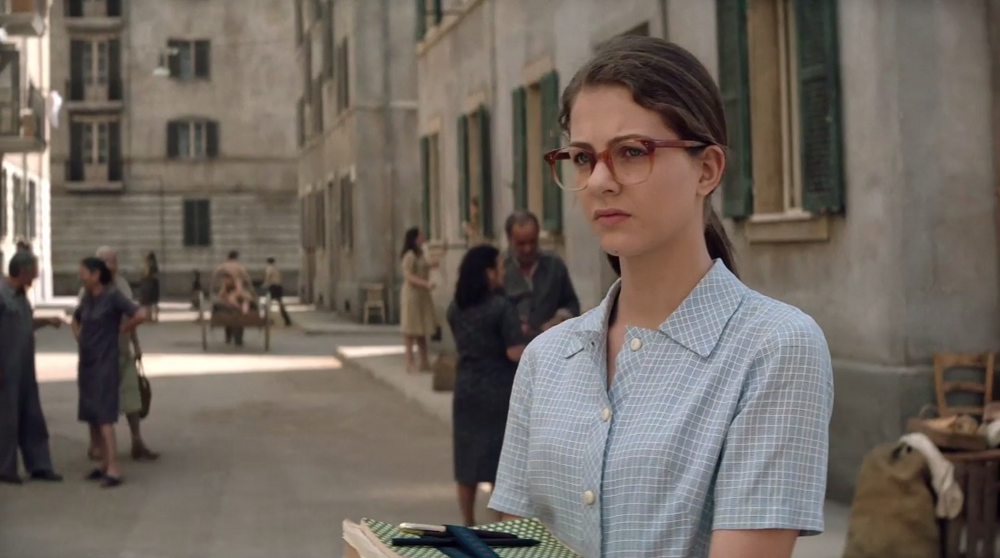My Brilliant Friend, Season 2: The Story of a New Name, Sky Atlantic review – a troubling friendship deepens | reviews, news & interviews
My Brilliant Friend, Season 2: The Story of a New Name, Sky Atlantic review – a troubling friendship deepens
My Brilliant Friend, Season 2: The Story of a New Name, Sky Atlantic review – a troubling friendship deepens
Painstakingly vivid serialisation of Elena Ferrante’s masterpiece glows again

In her surprisingly self-revealing collection of essays and interviews Frantumaglia (Neapolitan dialect word for a disquieting jumble of ideas), the writer who calls herself Elena Ferrante often ponders the metamorphosis from novel to film.
The language of cinema – and this HBO/RAI series is worthy of the highest accolade in that respect – can do much by itself. In a scene of almost hallucinogenic force, Lenù returns to the neighbourhood after a visit to her recently and disastrously married friend in an upmarket new development and looks at the older women in a different way (pictured below). Image does its work in telling us what she’s thinking before some of narrator Lenù’s lines reinforce the message as precisely as only the written word can: these women “had been consumed by the bodies of husbands, fathers, brothers, whom they ultimately came to resemble.” The balance is perfect.  Film also lends a different perspective. Keeping the narrative to a minimum, Costanzo's freedom, for the most part, from the authorial presence allows us to understand more clearly how similar Lenù is to her uncompromising and less fortunate “other half”. Without the text to guide us, we see how she can be similarly closed and silent, how in equal measure the opening-up to warmth, love and humour irradiates the formerly sullen faces.
Film also lends a different perspective. Keeping the narrative to a minimum, Costanzo's freedom, for the most part, from the authorial presence allows us to understand more clearly how similar Lenù is to her uncompromising and less fortunate “other half”. Without the text to guide us, we see how she can be similarly closed and silent, how in equal measure the opening-up to warmth, love and humour irradiates the formerly sullen faces.
Both actors, Margherita Mazzucco as Lenù and Gaia Girace as Lila, give the subtlest of performances, but it’s inevitable that attention is most riveted by Lila’s many transformations. Dressed up for a party given by Lenù’s middle-class intellectual teacher, her beauty shines like Audrey Hepburn’s Eliza Doolittle at the Embassy Ball of My Fair Lady. This, though, is real life; the outcome is not what we expect and the way the one friend turns on the other on the drive back with Lila’s husband Stefano (Giovanni Amura, pictured below with Mazzucco and Girace) is unforgettable and troubling. Costanzo holds the balance – Lenù has not behaved entirely well, either. We are allowed to make our own judgments without being told how we should react.  There's a tease in the filming of the way that Lila’s wedding photo hanging in the classy shoe shop gets recomposed, creatively remade by her as collage – we wonder if we’re going to be allowed to see it, and we do, though its life is short. By the end of the first four episodes, we’re back in Ischia, where Lenù’s first stint in My Brilliant Friend ended queasily, and this time it’s worse. No spoilers, but let’s say that Episode Four, which brings Lenù’s big love Nino Serratore (Francesco Serpico) to the beach, still keeps us guessing, and that it ends in a couple of disconcerting dream or half-dream images.
There's a tease in the filming of the way that Lila’s wedding photo hanging in the classy shoe shop gets recomposed, creatively remade by her as collage – we wonder if we’re going to be allowed to see it, and we do, though its life is short. By the end of the first four episodes, we’re back in Ischia, where Lenù’s first stint in My Brilliant Friend ended queasily, and this time it’s worse. No spoilers, but let’s say that Episode Four, which brings Lenù’s big love Nino Serratore (Francesco Serpico) to the beach, still keeps us guessing, and that it ends in a couple of disconcerting dream or half-dream images.
Production values are unremittingly high, though street dressing as we move out from the neighbourhood more frequently is never just for show – the details are telling. All the characters are perfectly cast, faces striking, especially those of the loan-shark, camorra-ist Solara family whose actions determine most of the disasters or plot twists. The music by Max Richter, whose every note when pushed to the foreground in his successful work as a leading composer strikes me as vapid and derivative, is perfectly modulated for discreet underscoring here, even if it's not needed, and the period sounds are always well chosen. From the new credit imagery, home-movie style, we’re told that we will be leaving Naples: the big change will come in this series, having taken up in Episode One immediately after the unhappy wedding party at the end of My Brilliant Friend (Season One). You know you can trust Costanzo and his accomplished cast to make every modulation perfect.
rating
Explore topics
Share this article
The future of Arts Journalism
You can stop theartsdesk.com closing!
We urgently need financing to survive. Our fundraising drive has thus far raised £49,000 but we need to reach £100,000 or we will be forced to close. Please contribute here: https://gofund.me/c3f6033d
And if you can forward this information to anyone who might assist, we’d be grateful.

Subscribe to theartsdesk.com
Thank you for continuing to read our work on theartsdesk.com. For unlimited access to every article in its entirety, including our archive of more than 15,000 pieces, we're asking for £5 per month or £40 per year. We feel it's a very good deal, and hope you do too.
To take a subscription now simply click here.
And if you're looking for that extra gift for a friend or family member, why not treat them to a theartsdesk.com gift subscription?
more TV
 theartsdesk Q&A: director Stefano Sollima on the relevance of true crime story 'The Monster of Florence'
The director of hit TV series 'Gomorrah' examines another dark dimension of Italian culture
theartsdesk Q&A: director Stefano Sollima on the relevance of true crime story 'The Monster of Florence'
The director of hit TV series 'Gomorrah' examines another dark dimension of Italian culture
 The Monster of Florence, Netflix review - dramatisation of notorious Italian serial killer mystery
Director Stefano Sollima's four-parter makes gruelling viewing
The Monster of Florence, Netflix review - dramatisation of notorious Italian serial killer mystery
Director Stefano Sollima's four-parter makes gruelling viewing
 The Diplomat, Season 3, Netflix review - Ambassador Kate Wyler becomes America's Second Lady
Soapy transatlantic political drama keeps the Special Relationship alive
The Diplomat, Season 3, Netflix review - Ambassador Kate Wyler becomes America's Second Lady
Soapy transatlantic political drama keeps the Special Relationship alive
 The Perfect Neighbor, Netflix review - Florida found-footage documentary is a harrowing watch
Sundance winner chronicles a death that should have been prevented
The Perfect Neighbor, Netflix review - Florida found-footage documentary is a harrowing watch
Sundance winner chronicles a death that should have been prevented
 Murder Before Evensong, Acorn TV review - death comes to the picturesque village of Champton
The Rev Richard Coles's sleuthing cleric hits the screen
Murder Before Evensong, Acorn TV review - death comes to the picturesque village of Champton
The Rev Richard Coles's sleuthing cleric hits the screen
 Black Rabbit, Netflix review - grime and punishment in New York City
Jude Law and Jason Bateman tread the thin line between love and hate
Black Rabbit, Netflix review - grime and punishment in New York City
Jude Law and Jason Bateman tread the thin line between love and hate
 The Hack, ITV review - plodding anatomy of twin UK scandals
Jack Thorne's skill can't disguise the bagginess of his double-headed material
The Hack, ITV review - plodding anatomy of twin UK scandals
Jack Thorne's skill can't disguise the bagginess of his double-headed material
 Slow Horses, Series 5, Apple TV+ review - terror, trauma and impeccable comic timing
Jackson Lamb's band of MI5 misfits continues to fascinate and amuse
Slow Horses, Series 5, Apple TV+ review - terror, trauma and impeccable comic timing
Jackson Lamb's band of MI5 misfits continues to fascinate and amuse
 Coldwater, ITV1 review - horror and black comedy in the Highlands
Superb cast lights up David Ireland's cunning thriller
Coldwater, ITV1 review - horror and black comedy in the Highlands
Superb cast lights up David Ireland's cunning thriller
 Blu-ray: The Sweeney - Series One
Influential and entertaining 1970s police drama, handsomely restored
Blu-ray: The Sweeney - Series One
Influential and entertaining 1970s police drama, handsomely restored
 I Fought the Law, ITVX review - how an 800-year-old law was challenged and changed
Sheridan Smith's raw performance dominates ITV's new docudrama about injustice
I Fought the Law, ITVX review - how an 800-year-old law was challenged and changed
Sheridan Smith's raw performance dominates ITV's new docudrama about injustice
 The Paper, Sky Max review - a spinoff of the US Office worth waiting 20 years for
Perfectly judged recycling of the original's key elements, with a star turn at its heart
The Paper, Sky Max review - a spinoff of the US Office worth waiting 20 years for
Perfectly judged recycling of the original's key elements, with a star turn at its heart

Add comment